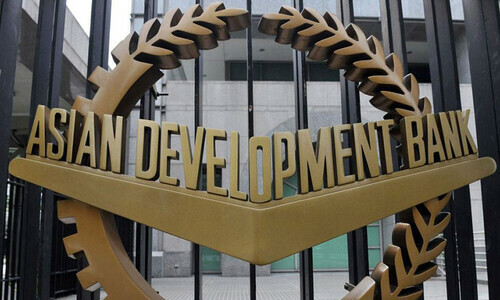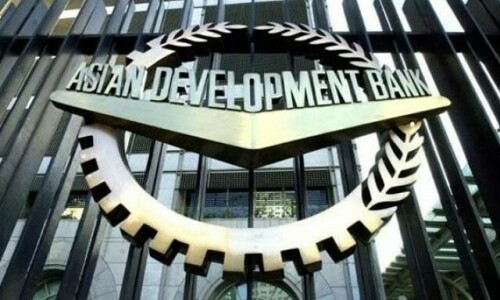• Amid election season, persistent political instability will remain a key risk
• Near-term prospects will heavily rely on progress under IMF-driven adjustments
ISLAMABAD: While the South Asian region will be growing at 5.4 per cent and maintaining single-digit inflation (at 6.6pc), the Asian Development Bank (ADB) forecasts Pakistan limping at 1.9pc growth rate and its population will continue reeling under elevated cost of living, reflected by a 25pc rate, during the current fiscal year.
In its flagship Asian Development Outlook (ADO) released on Wednesday, the ADB lowered the growth rate and increased the inflation outlook for Pakistan. “Pakistan’s gross domestic product (GDP) growth is projected to recover modestly to 1.9pc (instead of 2pc it forecast in April) in 2023-24 from 0.3pc in FY23, with price pressures remaining elevated,” the ADB said while simultaneously warning that “significant downside risks to the outlook remain, including from global price shocks and slower global growth”.
For the South Asian region, the Manila-based lending agency also revised marginally downward the growth rate to 5.4pc this year, instead of the earlier forecast of 5.5pc, and 6pc for next year instead of 6.1pc. The rate of inflation was put at 6.6pc this year. This outlook is driven by India — which accounts for 80pc of the South Asian economy — where growth for fiscal year 2023 was forecast at 6.3pc, a tad lower than April’s 6.4pc projection. Strong private consumption, and upticks in public and private investment, are expected to brighten India’s outlook. The slight downward revision for FY23 is due to erratic rainfall patterns during the monsoon, which will affect agriculture output in the upcoming harvest. For FY24, India’s forecast remains at 6.7pc.
The bank said Pakistan’s adherence to an economic adjustment programme through April 2024 will be critical to restoring macroeconomic stability and a gradual recovery of the country’s growth.
“Pakistan’s economic prospects are closely tied to the steadfast and consistent implementation of policy reforms to stabilise the economy and rebuild fiscal and external buffers,” said ADB Country Director for Pakistan Yong Ye, adding that greater fiscal discipline, a market-determined exchange rate, and speedier progress on reforms in the energy sector and state-owned enterprises are key to reviving economic growth and protecting social and development spending.
The ADB said Pakistan’s inflation was expected to ease to 25pc in FY24 (up from its April forecast of 15pc) from 29.2pc in FY23 as base-year effects set in, food supply normalises, and inflation expectations moderate. “However, sharp increases in energy tariffs under the economic adjustment programme, and the continued weakening of the rupee will keep inflationary pressures elevated.”
The bank warned that downside risks to the outlook remain exceptionally high. On the external front, tighter global financial conditions and potential supply chain disruptions from any escalation of the Russian invasion of Ukraine will weigh on the economy. Amid the upcoming election season, persistent political instability will remain a key risk to implementing reform toward growth stabilisation, the restoration of confidence, and sustainable debt. Also, the disbursement from multilateral and bilateral partners would remain crucial to reserve accumulation, exchange rate stability, and improved market sentiment, it added.
The economy’s near-term prospects will heavily rely on progress under the IMF-driven economic adjustment programme, which aims to stabilise the economy and rebuild buffers for domestic and external balance, thereby providing a foundation for a possible successor programme under the new government expected to be elected in the first quarter of calendar year 2024.
It said even the modest economic recovery forecast was based on a low base effect of 0.3pc growth last fiscal but uncertainty will linger and stabilisation measures will limit the growth of demand. The 1.9pc revised projection assumes a modest rebound in demand, with private consumption and private investment growing by about 3pc and 5pc, respectively. “Fiscal and monetary tightening will crimp demand, as will inflation staying in double digits”.
On the other hand, implementation of the economic adjustment programme and a likely smooth general election should boost confidence, while the easing of import controls should support investment as fiscal tightening restrains public consumption.
Published in Dawn, September 21st, 2023
















































Dear visitor, the comments section is undergoing an overhaul and will return soon.